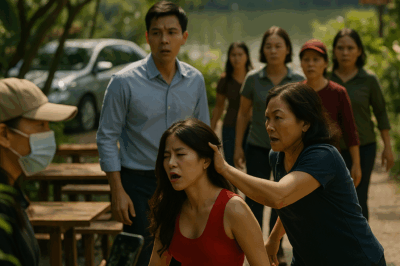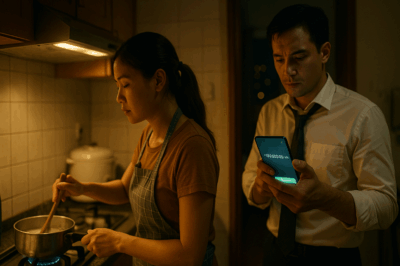The lunch table suddenly felt as heavy as a boulder when my mother-in-law, Mrs. Cúc, boldly declared:
“The eight houses will be divided equally among the sons, daughters, and grandchildren. Whoever is on the household registry, whoever shares our bloodline, will get a share.”
Chopsticks halted mid-air. Some faces looked confused, others held back laughter. Only I, seated closest to the kitchen, still held a calm expression as I picked up a piece of fish for my youngest daughter.
I heard her words clearly—too clearly. They burned in my chest. Everyone sitting at that table was family—at least on paper. But in over twenty years of being a daughter-in-law, I had never truly felt like I belonged in this house.
When I first married Quang and moved in, I was 21, empty-handed except for a suitcase of old clothes.
Today’s lunch was meant to be a family gathering, with a lawyer present to notarize the inheritance. My father-in-law passed away five years ago. Back then, Mrs. Cúc had said, “Just leave it for now, we’ll divide it when things are settled.” What “settled” meant, no one ever knew. But today it was clear: everything had been neatly calculated—for everyone, except me.
I sat quietly in a corner on a short wooden stool next to the fridge that hummed loudly. My youngest, still happily chewing her food, had no idea what was going on. I, meanwhile, heard every word as my mother-in-law rattled off names, house addresses, and property deeds like carving up pieces of my heart.
Quang, my husband, sat beside her, his face cold. Not once did he glance at me the entire time. I saw his expression when she said,
“The house on Trần Phú Street will go to Nam and his wife. The youngest needs a place to run a business.”
Then she turned and added,
“As for Duyên and Hòa, each of you gets a house in the alley, for your kids to study in later. I’ve thought it all through—I won’t let you suffer.”
Suddenly, Duyên spoke up, half-joking, half-serious:
“What about Thu? She’s lived with us for 20 years—does she get nothing?”
The room went silent.
Mrs. Cúc calmly picked up a piece of chicken and spoke while chewing:
“She’s a daughter-in-law. What is there to divide for her? She has her own parents and siblings. Later, they can pass something down to her. Ours is for blood relatives.”
I looked at the piece of fish in my daughter’s bowl. It suddenly tasted too fishy, my hand trembled slightly, but I kept my face still. No one said a word. Quang still didn’t speak.
He once promised, “Whatever gets divided, your name will be on it too. We’re married—I won’t let you suffer.”
But today, in front of ten people, he chose silence.
This wasn’t the first time my name had been left out.
In twenty years living here, no one ever called me “Sister Thu” properly. My mother-in-law called me “that one,” and whenever she needed something, she wouldn’t even look at me.
“Has that daughter-in-law swept the yard yet?”
“Is she done cooking?”
“What are you waiting for?”
“She can’t have kids, then move out and let someone else give us grandchildren.”
She said that the first time I had a miscarriage at age 24. That day it rained. I had carried ten bags of rice from the yard to the kitchen because she was afraid water would get into the house. I slipped and fell. The pain was unbearable. By the time we got to the hospital, it was too late to save the baby.
She didn’t cry. She just said coldly, “If the baby couldn’t stay, then so be it. The blessed ones stay; the unlucky ones don’t.”
Quang stood in a corner, smoking, silent.
I once thought maybe I wasn’t good enough—so I tried harder.
I cared for my in-laws. I washed everyone’s clothes. I took my husband’s younger sibling to school, even saved up for years to buy secondhand textbooks.
I even saved up grocery money for three years to buy a water purifier for the whole family. But no one remembered that.
And today, when Mrs. Cúc divided the land and houses down to the square meter for each child, I understood: all my effort meant nothing in their eyes.
I was just an outsider—an outsider who had been “squatting” here for 20 years.
Laughter broke my train of thought. Nam, my brother-in-law, grinned:
“Mom, the house on the main road is perfect for my wife’s salon. But isn’t it funny that Sister Thu, our eldest sister-in-law who’s lived with us all this time, gets nothing?”
The table erupted in laughter. Hòa added,
“Maybe it’s because she didn’t have a son. If she had a grandson for Mom, maybe things would be different!”
For the first time that entire meal, I stood up. Calmly, I placed my bowl back down.
No one noticed when I started crying. I didn’t sob aloud—just streams of salty tears silently slipping from the corners of my eyes, down my cheeks, and onto my cold neck. I bowed politely to the lawyer. Then I looked at Quang—the only gaze I had hoped for—but he only lowered his head to avoid mine.
I walked toward the kitchen, to the small table where I had eaten alone since the first day I became a daughter-in-law. No one had ever joined me there. I wiped my face, neatly stacked the half-washed glasses, and quietly slipped out the back door.
The sun was directly overhead in the yard. A flock of chicks clumsily followed their mother. I watched them for a while, then turned to leave. Behind me, I heard Mrs. Cúc’s voice:
“A daughter-in-law has no right to ask for anything. Only blood counts.”
I didn’t turn back. I just thought: twenty years living in a house where even my name was never called.
I returned to the small room at the end of the hallway—the one with a wooden door eaten away by termites near the bottom. That room had been mine for the past 20 years. Although it was called the “marital room,” I was the only one who used it. Quang always slept in his own room, claiming he needed quiet for work.
That evening, after the fateful lunch, I opened the faded wooden wardrobe. Behind the old clothes, I took out a small rusty metal box. Inside it was a hard-cover notebook and some old, yellowing documents. I carefully opened a yellow envelope. The paper inside trembled in my hand, but the writing was still clear—it was a notarized deed, transferring ownership of a property to Mrs. Nguyễn Thị Thu, at 12/Năm Nguyễn Trãi Street.
That was the very house I had lived in since the day I got married—the house everyone assumed was inherited by Quang from his parents.
But the truth was, a year before he passed, my father-in-law secretly transferred the house to me. That day, he called me to the backyard and said in his deep, hoarse voice:
“I know you haven’t been treated fairly. But you’re hardworking and kind. This house is for you. No one has the right to take it.”
I dropped to my knees, crying uncontrollably. But I told no one. I knew if they found out, I would no longer have a place in this home. And just as I feared, after he died, Mrs. Cúc never mentioned the deed. She announced the house was still part of the unallocated estate. When I asked Quang, he avoided answering.
I even caught her a few times secretly calling people over to renovate the house and change the lock on the front door.
Though I never signed anything, I quietly had the land title reissued under my name. I did it all alone—filed the paperwork, paid the taxes, followed every legal step. It took nearly two years, but finally, I held the bright red land certificate in my hands.
Owner: Nguyễn Thị Thu.
I placed it back in the box and never took it out again. Even during the nights I cried myself to sleep from the constant scolding and humiliation.
A week after that lunch, I received an unmarked envelope slipped under my door. Inside was a bank statement for the joint account I once shared with Quang.
But strangely, the account had been in his name alone since last year. My name had been removed—no notification, no consent, no signature.
I went straight to the bank.
The staff looked at my ID and asked, “You were the original guarantor for this account, but three months ago Mr. Quang filed to transfer ownership with an authorized signature.”
I went numb.
Back home, I searched through our old document cabinet. Among the scattered papers, I found a thin stack—the handwriting practice sheets my brother-in-law had used back when he studied accounting. The name Nguyễn Thị Thu was forged over and over, so precisely it looked more like my signature than my real one.
I understood then. Everyone in this house had planned for this all along—not just to divide the inheritance, but to erase me from it entirely.
I felt a crushing weight on my chest, like I could collapse. But I didn’t cry.
For the first time in years of holding back, something awakened inside me. Not hatred—but a cold, focused clarity.
I sat down, opened my banking app, and screenshot every transaction I had made—my salary deposits, the money from selling gold to fix the awning, the money I spent on my niece’s study desk. All the money was in Quang’s name, but it was mine.
I printed the records, marked each date. I remembered every item. Every time Mrs. Cúc told me that as a daughter-in-law, it was natural to take care of the in-laws—and I shouldn’t expect recognition.
Fine. I wouldn’t demand gratitude. I’d document every cent—to prepare.
The next day, I took a day off from work.
I went straight to the lawyer’s office who had once handled my father-in-law’s paperwork. He still remembered me.
After examining the original house deed, he nodded, “This is still valid. It was legally notarized and transferred. If anyone violates your property rights, you can file a lawsuit.”
I thanked him.
It felt like someone had finally lit a lamp inside me after years of wandering in the dark.
That evening, there was an ancestral memorial. Mrs. Cúc prepared several meal trays and invited the entire extended family. I still woke early, cooked, cleaned, and carefully packed every dish.
No one knew that the next morning, I would file a formal complaint with the local authority—requesting an investigation into the forged signature and unlawful transfer of property.
I wore the blue áo dài my father-in-law had given me when I gave birth to my eldest daughter.
The whole family whispered: “Still dressing up? Doesn’t she know her place?”
I smiled gently and poured wine for each guest.
When I poured for Quang, I looked him straight in the eye and said:
“Drink this. You may need it soon.”
He froze, then looked away.
Mrs. Cúc snapped,
“Women like you never know how to keep a husband. This house has no place for you to make demands.”
I nodded,
“Yes, I know. I’m not demanding anything. I’m just holding on to what’s mine.”
I turned into the kitchen. Behind me, the house was still buzzing with laughter and chatter.
But from that moment on, I was no longer the nameless woman hidden behind the pillar, carrying dishes.
Inside me, a door had opened—not one anyone gave me the key to, but one I held the original key for all along.
News of me quietly filing the complaint and registering the house in my own name quickly reached the family.
No one confronted me directly.
But at dinner, there were fewer conversations. Chopsticks were dropped harder against bowls. Quang looked past me like I was a stranger. My brother-in-law made loud phone calls on purpose:
“Some people leech off others their whole lives and still think they’re noble. Just wait—karma sees everything.”
I didn’t respond.
I just smiled and locked my documents inside the new safe with my own password.
This house—I secured it with my own two hands.
Not to win. But to make sure my children always have a place to come home to—and call it “Mom’s house.”
But then, one October evening, just as I got home from work, my phone rang. A panicked neighbor reported that my mother-in-law had collapsed at the market and was being taken to the hospital. I didn’t even take off my coat—I rushed to the hospital. On the emergency bed, Mrs. Cuc lay there, pale-faced, her eyes barely open. My two sisters-in-law were frantically signing admission papers, but Quang hadn’t arrived yet.
I stood at the foot of the bed, unsure whether to step forward, when suddenly she moved slightly. Her eyelids fluttered, and her lips parted faintly: “Thu…” All three standing by her bed looked confused. I stepped closer and held her hand. “It’s me, Mom. It’s Thu.” She squeezed my hand ever so lightly, as if afraid that any pressure would shatter the moment.
I held her hand, feeling the chill spreading from her fingertips. Despite all the scolding, the insults, and being told I wasn’t blood, in that moment, all I saw was a frail, little old woman. The doctor diagnosed a stroke—paralysis on one side—and said she would need constant care. The family gathered. The two sisters-in-law each made excuses. “I’m busy with work, my company’s laying off staff.” “My husband says it’s inconvenient. In-laws under one roof tend to clash.” Quang calmly added, “I’m sorry. I have some long business trips coming up, and the kids are about to take exams.”
I listened in silence, not surprised. I just nodded. Then I stood up and said clearly, “Alright. She called my name, so I’ll take care of her. But from now on, I make all the decisions in that house—who comes in, how the house is renovated or divided. If anyone disagrees, find somewhere else to live.” No one said a word. Only her eyes glistened like rain, and she nodded slightly.
In the days that followed, I quit my job to stay with her. I fed her spoon by spoon, wiped every drop of saliva that spilled from her lips, and washed her hair with warm towels. She could no longer speak, but her eyes remained expressive. Every time I tucked her in, she would hold my hand for a long time, as if truly seeing me for the first time.
One evening, as I adjusted her pillow, she suddenly grabbed my hand, her eyes red with tears. She motioned toward the nightstand drawer. I opened it and found an old cloth bundle and a small notebook. Inside was a handwritten diary—her handwriting, uneven but clear.
“The day my daughter-in-law was scolded for dropping braised fish, she quietly went and bought more with her own money.”
“The day her father-in-law died, she was the only one who sat vigil by the casket all night.”
“The day she was falsely accused of stealing gold, she didn’t cry—she just smiled and slipped her savings into my hand.”
Each line scraped a fresh wound into my heart. I thought she had forgotten—but she remembered everything. She had just never admitted it. I held the notebook, tears streaming down my face. Mom, you still owe me one apology—but it’s okay. Calling my name was enough.
Three weeks later, her health declined. I knew she was waiting for something.
That moment came on a rainy afternoon. Quang returned with a bouquet and a document—a request to transfer all shared assets to the younger son, already signed by his mother, and notarized beforehand. I looked at him, unsurprised.
“Do you think she’s still lucid enough to sign anything now?” I asked. “Or were you planning to use that paper to wash your hands clean?” He flinched, but stayed calm. “Legally, marital property is jointly owned. Don’t think you’re smarter than everyone else.”
I said nothing. I simply pulled out the original deed transferring the house to me from my father-in-law. Then I played a voice recording—her signaling me toward the drawer, and my voice reading out her diary entries. Quang’s face turned pale. He said nothing more.
“If you have any conscience left,” I said softly, “let her rest in peace. I’m not asking for any division. I’ll just keep the house. You can do whatever you want with the rest.”
That night, she was noticeably weaker. I tucked her in, wiped her face, lit incense beside the bed. She opened her eyes one last time, her lips moving without sound. I leaned in close to listen. “Thu…” I gripped her hand, tears falling onto her cheek. “It’s me.”
That was the last word she left for this world. She didn’t call her husband. She didn’t call her own children. She called me—the daughter-in-law once considered an outsider.
As the hearse brought her home to the sound of somber horns, I stood at the door, still clutching her diary. The house was brightly lit, filled with people, yet quiet—as though everyone could hear something that had never been spoken aloud.
That I, the one always treated as invisible, was the last person she called by name.
After my mother-in-law’s funeral, the once-crowded house fell strangely silent. No one said a word, but all voices instinctively lowered, as if afraid to disturb the soul that had just departed. In the days that followed, I was still the one lighting incense, sorting documents, packing up her belongings—not out of obligation, but from a kind of affection that came late, but not too late.
On the altar, I placed the worn notebook she had left behind next to her enlarged memorial photo. Every time I looked into those eyes, I felt as though she was still watching over me. No longer as the mistress of the house, no longer a judge, but as a real mother. The only regret was that the embraces came too late.
Just when I thought everything had settled, a week later, I received a court summons. The petitioner: Nguyễn Quốc Quang—my ex-husband. The subject: a dispute over post-marital asset ownership. I sat frozen in front of the paper, my hands cold. I thought everything had ended with that last stick of incense sent off with her spirit. But it turned out to be the beginning of the final game.
He didn’t send a message, didn’t call, didn’t try to negotiate. I knew he didn’t need the money—he needed to win.
At the first mediation hearing, he showed up with his private lawyer, neatly dressed, composed, his eyes calm—devoid of anger, but also void of affection. His lawyer spoke confidently:
“My client contributed financially during the marriage and has the right to claim ownership of the current house, which is believed to be a dowry but cannot be proven to be a personal gift.”
I calmly presented a notarized document from my late father-in-law, clearly stating that the house was gifted exclusively to me, with full name and date. Then, I gently placed the mother-in-law’s diary on the table.
“I don’t wish to fight for ownership,” I said, “but I want the truth to be seen.”
Their lawyer ignored the notebook. My ex-husband remained silent, eyes fixed out the window—an evasive gaze.
The court scheduled a second mediation. I agreed, but this time I had my own plan.
I was never meant to win in court. But I knew that if some lives remain silent, they will forever be buried like wild grass under heavy boots. I sent a copy of the diary to the magazine Women & Life, under the anonymous stories section—no names, no accusations, just a mother’s handwritten thoughts about a daughter-in-law once seen as an outsider.
The article spread quickly, garnering thousands of comments in just a few days. Many saw their own stories in it—silent daughters-in-law, mothers who realized the truth too late, husbands forever caught in between, never knowing who truly loved them. I didn’t give interviews, didn’t show my face, but in my heart, I felt that it was enough.
On the day of the hearing, I dressed simply in the old áo dài my mother-in-law had sewn for me years ago for my father-in-law’s death anniversary. It was faded now, but intact. I entered the courtroom with a different posture—not to win, but to stand tall.
The judge asked, “Does the defendant have a statement regarding the asset division request?”
I answered calmly, “I agree to divide everything, but I ask to keep the house. I’ll transfer the rest—the savings account, the land, the company shares. I only ask to keep the place where I cared for my mother-in-law until her last breath.”
Quang’s side looked surprised. His lawyer quickly tried to challenge it, saying I hadn’t proven any significant contribution. I silently played a voice recording—the moment in the hospital when my mother-in-law called my name for the first time. Then I played her faint voice saying,
“The house is for Thu. I leave it to her.”
The courtroom fell silent. Quang lowered his head. The judge thought deeply for a long time before announcing the decision:
“Based on the documents and evidence, the house is confirmed as a personal gift. The remaining assets shall be divided equally.”
I nodded. I didn’t smile, didn’t cry. It was enough that she had seen the truth, and I didn’t need to win—only to be seen.
That night, I returned home alone. The house was quiet. I quietly opened the safe, took out the little cloth my mother-in-law used to tie her hair, folded it neatly, and placed it in my suitcase. I decided to leave—not because I had lost, but because my role was complete. The house was legally mine, but I would rent it out. I planned to return to the countryside, open a small eatery, and start over with my own hands, no longer living under anyone’s shadow.
Before locking the door, I left a note on the living room table:
“I don’t need to win. I just needed to be seen. And today, I was.”
I stepped outside the gate, no longer burdened by bitterness—only a light emptiness, like wind brushing through a thin shirt. In my hands, I carried only two things: the original house deed, and my mother-in-law’s diary. The rest, I left behind.
From afar, the temple bell chimed. The air was quiet and warm. I turned back to look at the house one last time—not out of regret, but to remember that once, there was a woman called an outsider, and in the end, she was the only one whose name was called in the final moments.
News
After giving birth, the wife suffered complications that left her unable to walk normally. The husband abandoned his wife and newborn to chase another, wealthier woman—and exactly three years later he was left humiliated when he heard the news…/th
After giving birth, the wife suffered complications that left her unable to walk normally. The husband abandoned his wife and…
An elderly father—“the poor egg seller”—came to his son’s wedding carrying nothing but a bag of eggs as a gift, and what the daughter-in-law did left everyone speechless…/th
An elderly father—“the poor egg seller”—came to his son’s wedding carrying nothing but a bag of eggs as a gift,…
Happy to have married a rich man, with our own condo in the heart of District 1—on our wedding night, I was stunned into silence by his whisper/th
Happy to have married a rich man, with our own condo in the heart of District 1—on our wedding night,…
“Today my husband took my car to drive his young mistress around; I left the two of them so humiliated they had nowhere to hide.”/th
On Saturday morning, Ly noticed the side mirror of the silver car tilted hard to the right. On the passenger…
My husband secretly withdrew our savings to help his mistress open a spa. She even bragged about it all over social media, and I quietly did something that made the two of them…/th
The Mint Scent of the Truth Lan’s phone chimed a little “ting” in the middle of the oil crackling on…
In 2007, my younger brother went missing. My parents searched for 18 years in vain. One time on a business trip, my older brother saw a waiter and burst into sobs…/th
In 2007, my younger brother went missing. My parents searched for 18 years in vain. One time on a business…
End of content
No more pages to load












